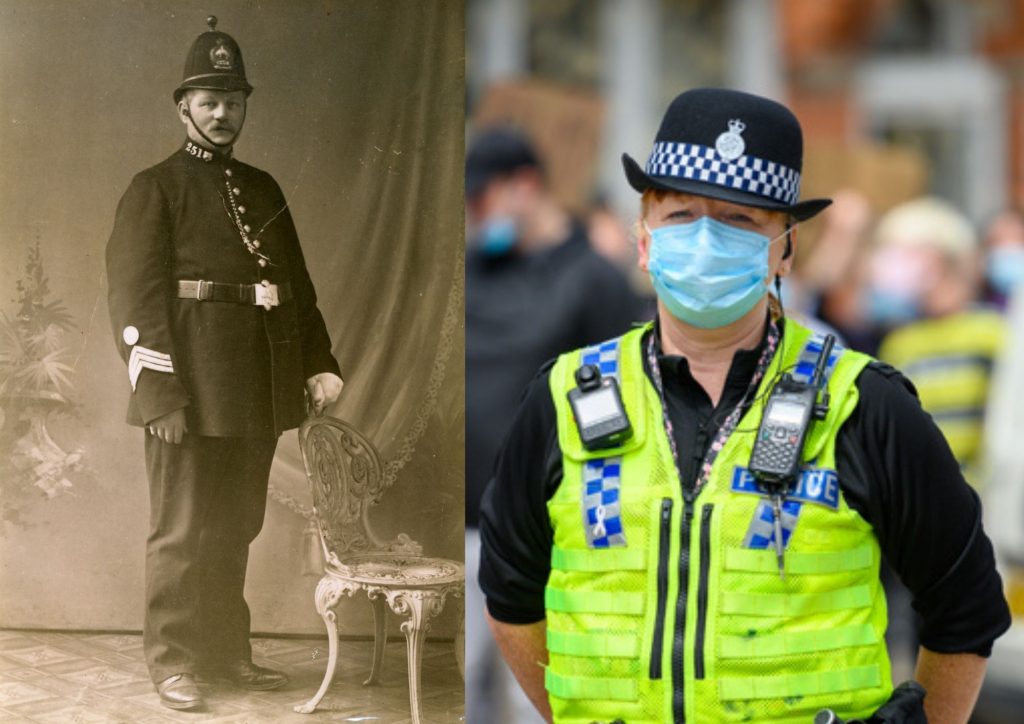
Not Uniform
COVID’s legacy for police of elision and mistrust
Dr Camilla de Camargo, lecturer in criminology at Lancaster University, discusses how Covid changed her research, and how existing issues have been exacerbated by the pandemic.
 I’ve long been interested in public perceptions of police. For my PhD, I shadowed policing teams in Greater Manchester to look at the symbolism of the police uniform – how the uniform has changed since its first UK inception in 1829, moving from military-style combat wear to more professionalised shirt and tie (and back again!) is indicative of shifting ideas about the legitimate role of the police. In a country of autonomous regional forces, these shifts happen over space as well as time. I spent six years in London and was often conscious of armed officers in London train stations gave way to more visibly community-style policing when I travelled back to the north.
I’ve long been interested in public perceptions of police. For my PhD, I shadowed policing teams in Greater Manchester to look at the symbolism of the police uniform – how the uniform has changed since its first UK inception in 1829, moving from military-style combat wear to more professionalised shirt and tie (and back again!) is indicative of shifting ideas about the legitimate role of the police. In a country of autonomous regional forces, these shifts happen over space as well as time. I spent six years in London and was often conscious of armed officers in London train stations gave way to more visibly community-style policing when I travelled back to the north.
Symbols to scarcity
At the start of COVID, my research on uniforms took a different turn when I started looking at police use of personal protective equipment. During the first few months of COVID it was a particularly worrying time for officers as PPE wasn’t available – I conducted a small research project in May 2020 interviewing 18 front-line police officers from 11 different forces in the UK (re-interviewing 10 of them in April 2022) about their fears and anxiety of transmission/contraction of COVID to themselves and their families.
High exposure
Police were left out of the first two vaccines rollouts as the government did not prioritise them, and the Office for National Statistics judged that policing was not a ‘high exposure occupation’. Officers were told by managers not to bother getting tested as it was inevitable that they would catch it and when officers did try to get tested, ‘police’ were not featured on the drop-down menu of key workers on the NHS website for quite some time.
Officers were told by managers not to bother getting tested as it was inevitable that they would catch it…
This fed into narratives around how some occupations (those working for the NHS, refuse collectors etc.) enjoyed a rise in occupational prestige and experienced outpourings of appreciation and gratitude as part of the iconic 8pm Thursday clap while the police were ignored. Some officers in my study told of being booed and jeered when they tried to access key worker benefits during COVID, and results from well-being surveys show that morale is at an all-time low in policing, and officers trying to access mental health support are waiting several months for appointments.
Confusion and mis-trust
The enforcement of the government’s confusing coronavirus regulations (guidance, rules, law? Even police officers didn’t know…); which changed 65 times in just nine months, meant that policing became harder even than usual. The media reported on many examples of over-zealous officers’ issuing fixed penalty notices, reciting incorrect ‘rules’ to encourage compliance and misinterpretation of rules on what was ‘essential travel’, and ‘essential items’ in shopping trollies.
regulations…changed 65 times in just nine months
To summarise, I found that public trust in policing has been further damaged by Covid (not helped of course by the Partygate scandal). Whilst officers in my story spoke about their understanding that they didn’t join policing to be popular, COVID has unfortunately offered many opportunities for the police to be negatively portrayed and ignored as keyworkers, leading to rising levels of mental health issues amongst staff.
Vital Lessons
I’m really interested in how issues for police well-being, present prior to COVID, have been exacerbated by the pandemic. The poor handling and mismanagement of this is not to be underestimated – while COVID seems to have all but disappeared from people’s minds, the legacy of the government’s handling of the crisis, and the police’s job to enforce the restrictions will remain for some time.
issues for police well-being…have been exacerbated by the pandemic.
The longevity of this type of empirical research is important – after all, many scientists have reported that we are very likely to see another pandemic in our lifetimes, so it is vital to learn from the crises.
Covid recruits – collaboration opportunity
As part of my research, I am interested in new recruits’ training and retention during the Police Uplift programme and the experience of recruits joining the police just before and during COVID. I would love to hear from anyone interested in collaborating in these areas – these issues in policing are not going away and I am passionate about working directly with police forces and front-line officers to consider the implications of these experiences for policy and practice.
Get in touch at c.decamargo@lancaster.ac.uk
Further reading
For more about policing the pandemic, see our reports on ethnic disproportionality and FPNs, and changing demand for police during Covid.
Dr De Carmargo’s publications on the research discussed in this post are available here:
De Camargo, C. R. (2021) ‘The weaponising of COVID-19: Contamination prevention and the use of spit hoods in UK policing’, The Police Journal: Theory, Practice and Principles, 1-22, available at: https://doi.org/10.1177/0032258X211018787
De Camargo, C. R., and Whiley, L. A. (2021) ‘There’s always got to be a villain’: the police as ‘dirty’ key workers and the effects on occupational prestige’, Policing and Society: An International Journal of Research & Policy, available at: https://doi.org/10.1080/10439463.2021.1928124
De Camargo, C. R. (2021) ‘The postcode lottery of safety: COVID-19 guidance and shortages of personal protective equipment (PPE) for UK police officers’, Policing and Society: An International Journal of Research & Policy, available at: https://doi.org/10.1177/0032258X211018768
De Camargo, C. R. (2021) ‘It’s tough shit, basically, that you’re all gonna get it’: UK virus testing and police officer anxieties of contracting COVID-19’, The Police Journal: Theory, Practice & Principles, available at: https://doi.org/10.1080/10439463.2021.1883609









0 Comments